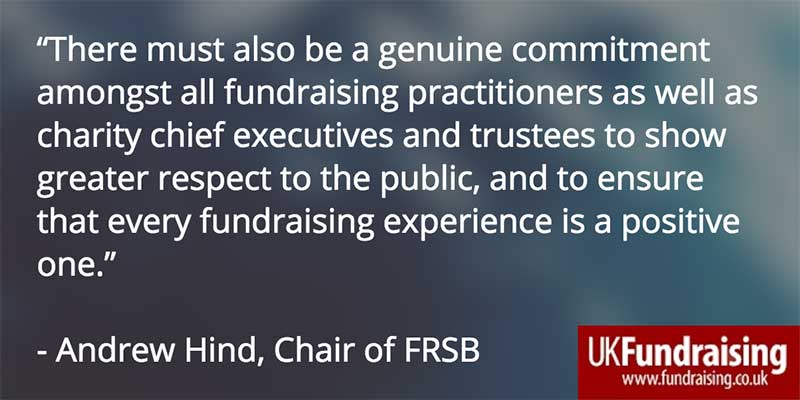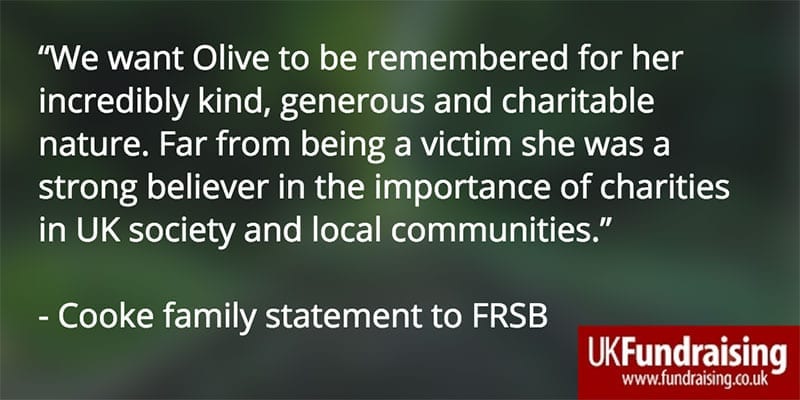FRSB publishes results of Olive Cooke investigation and related complaints
The Fundraising Standards Board (FRSB) has published the results of its investigation into the case of Olive Cooke and complaints about charity fundraising received in the weeks following her death.
• data sharing by charities led to a high volume of fundraising approaches to Mrs Cooke
• Mrs Cooke’s details held on donor lists maintained by 22 commercial data suppliers
• insufficient opportunities in most cases for her to opt out of receiving future mailings
The FRSB’s report, published today, confirms that the sharing of Mrs Cooke’s personal details by charities which she supported led to her receiving ever-growing volumes of fundraising mail from other charities, leading her to feel ‘overwhelmed’ by the number of requests to donate.
Background to the investigation
The investigation began on 18 May 2015 following media reports that suggested direct links between Mrs Cooke’s death and the volume of fundraising approaches she received. These resulted in further complaints about charity fundraising to the FRSB in the following weeks.
The FRSB asked its member charities and 30 other charities to help it with its investigation: 1,442 charities participated.
How many charities contacted Mrs Cooke?
The FRSB’s investigation confirmed that Mrs Cooke had been a long-term generous supporter. She had given to at least 88 charities during her lifetime, 48 of them regularly. She had also collected as a volunteer for many years for the Royal British Legion.
Of the 1,442 charities that too part in the investigation:
• 99 had Mrs Cooke’s details on file
• of these 19 had begun contacting her before 2000
• 32 charities began communicating with her in the past five years
Each charity sent Mrs Cooke an average of around six mailings each year. As she gave to more charities and they contacted her, the total number of mailings from the charities that took part in the investigation rose from 119 in 2000 to 466 in 2014.
This is one sixth of the number that Mrs Cooke claimed she had been receiving when she was interviewed by The Bristol Post on 30 October 2014.
In his introduction to the report findings, Andrew Hind, Chair of the Fundraising Standards Board, acknowledged that:
Advertisement
“It must be acknowledged that individual charities had no way of knowing the cumulative impact of their practices or how many other organisations might be approaching Mrs Cooke at any one time”.
On the other hand:
“One might question whether more consideration could have been given by charities to the potential consequences of sharing her details so extensively and indeed how charities can prevent this from happening in the future”.
Sharing of Mrs Cooke’s data
The FRSB reports that:
• 24 of the 99 charities had passed Mrs Cooke’s contact details to another organisation
• seven in ten had obtained her contact details from a third party, such as another charity or a commercial list broker or data supplier.
• her details were held on donor lists maintained by 22 separate commercial data suppliers
Insufficient opt-out procedures
The volume of fundraising mailings was compounded by the fact that most communications she received, according to the FRSB, did not make it easy for her to choose to stop receiving future mailings. Only 14 of the 99 charities that wrote to Mrs Cooke offered her the specific opportunity to opt out of more mailings with a tick box in each communication.
Instead, most charities required donors to make the effort to contact them to ask to be removed, should they wish to.
Analysis of further complaints to FRSB
The FRSB’s report also examines the stream of complaints received from other donors following the news coverage of Mrs Cooke’s death. Following the extensive and ongoing newspaper coverage, the self-regulatory body received 384 complaints about charity fundraising from across the UK in the three weeks following her death (15 May to 5 June 2015).
The FRSB reports that of these:
• 70% related to direct mail activity;
• 42% addressed the frequency of charity communications;
• 35% were specific to fundraising approaches made to the elderly or vulnerable people;
• 16% were about how consent is given for charities’ use of contact data, with concerns that the current opting out measures for charity communications was unclear.

Comment by Andrew Hind in the FRSB report’s introduction.
Andrew Hind said:
“Mrs Cooke’s experience demonstrates the inevitable consequences of a fundraising regime where charities have been willing to exchange or sell the personal details of donors to each other, and to commercial third parties. But Mrs Cooke was not alone. Her experiences were echoed in the many complaints that the FRSB received following her death.”
The findings on these subsequent complaints were published by the FRSB in an interim report in June 2015. The report’s recommendations resulted in a number of substantial changes to the Institute of Fundraising’s Code of Fundraising Practice over the next few months. These include:
• requirement for charities to provide clear opportunities to opt out of further fundraising communications in every written communication
• requiring all charities and their fundraising agencies to end a fundraising call when asked and stipulating that calls must be made from an identifiable number that can be checked or reported
• providing greater clarity on the requirements of the Data Protection Act and the Privacy and Electronic Communications Regulations as enforced by the Information Commissioner’s Office
A future change will ban charities from sharing individuals’ data without express consent.
Hind added:
“We welcome the significant strengthening of the Code of Fundraising Practice in response to our Interim Report. The FRSB believes that if charities fully comply with the newly strengthened fundraising standards and reposition donors at the heart of their fundraising activities, this will go a long way towards ensuring that donors in the future will not be placed under the same pressures as those confronting Mrs Cooke”.
He concluded that the investigation served to underline “the need for a charity’s right to ask for funds to be balanced with the public’s right to say no”.
What the Cooke family said
Appropriately, given how so much was assumed about Mrs Cooke and conclusions drawn in contradiction to her family’s comments, the FRSB has given her family prominence in the report by reproducing their statement to the FSRB at the beginning of the report.
In this they say:

How the Cooke family would like Olive Cooke to be remembered.
They expressed their gratitude to the FRSB for conducting the investigation and said that they were pleased that there had been changes to the Code of Practice and to the law “to prevent elderly and vulnerable people being pressurised to give when they can’t”.
They also welcomed the planned introduction of a Fundraising Preference Service in this regard, specifying that it “will mean that vulnerable people can put a stop to fundraising approaches in the future if they want to”.
Statement from Olive Cooke's family to @thefrsb inquiry, which found charities didn't give opt-out opportunities pic.twitter.com/piLS2CUxX2
— Aidan Warner (@aidanwarner) January 20, 2016
Direct Marketing Association responds
The DMA’s Managing Director Rachel Aldighieri responded to the FRSB’s findings, saying:
“This report shows that charities routinely failed to consider their donors. The charitable sector is in a curious position because it has often been at arm’s length to the rest of the economy. The events of the summer mean that this can no longer be the case. Fundraising is to charities what marketing is to business and trust in fundraising needs to be rebuilt.
“The only way of doing this is by charities putting their customers – the donors – at the heart of everything they do, which is the key principle of the DMA Code.”
Institute of Fundraising’s reaction
Peter Lewis, Chief Executive of the Institute of Fundraising, said of the report’s findings:
“We welcome the FRSB’s report today following the tragic death of Mrs Olive Cooke who was such a generous supporter of so many causes. We are glad that the FRSB has recognised that the changes agreed to the Code of Fundraising Practice will improve fundraising standards to help to avoid people feeling overwhelmed with approaches from charities in future. Fundraising is essential to the good work that charities carry out across the country. We will work to support charities and individual fundraisers to rebuild trust of the public and long-term support from donors”.
Suzanne McCarthy, independent Chair of the IoF’s Standards Committee, added:
“The report highlights several of the important changes that the Standards Committee made over the summer to the Code of Fundraising Practice following the FRSB’s interim report. These will help to ensure that people have more control over the contact they have with charities. The Code bans the selling of supporters’ information. The Committee will continue to look at ways to improve the Code”.
You can download the25-page FRSB Investigation Report Into Charity Fundraising Practices Instigated by the Mrs Cooke Case (in PDF).
"She donated to 88, 48 of them regularly." We should remember that Olive Cook was one amazing person. https://t.co/IucNfJ1g7Y
— Matthew Sherrington 💙🧡 (@m_sherrington) January 21, 2016
![]()
![]()



